Panchkula/ Delhi (PIB): In a landmark moment in India’s TB elimination efforts, the Union Minister of Health and Family Welfare, Shri Jagat Prakash Nadda launched the intensified 100 Day TB elimination campaign in the presence of Shri Nayab Singh Saini, Chief Minister, Haryana, and Smt. Arti Singh Rao, Health Minister of Haryana, in Panchkula, Haryana, today. Shri Prataprao Jadhav and Smt. Anupriya Patel, Union Ministers of State for Health and Family Welfare also joined the event virtually. The goal of this campaign, which will be implemented in 347 districts across the country is to find and treat missing TB cases, especially in high-risk groups, and reduce TB deaths significantly.
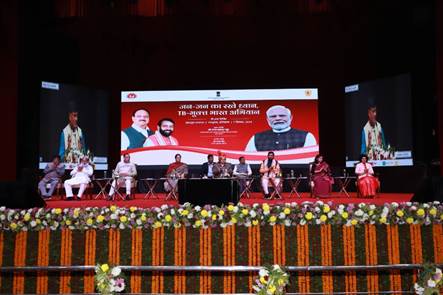
Addressing the gathering, the Union Health Minister highlighted the government’s unwavering commitment to end TB and stated that this campaign is launched with the intention to give a new momentum to the goal of TB-Mukt Bharat (TB free India). Noting that this will be a focused campaign of 100 days, he stated that the effort will be to quickly detect and treat TB patients in the 347 most affected districts.
Shri Nadda highlighted the long struggle that the country has faced in its fight against TB. “There was a time when TB was considered as a ‘slow death’ and even family members suffering from TB were separated and isolated to prevent its spread. And since 1962, there have been many campaigns against TB, but, in 2018 the Hon’ble Prime Minister made the vision to end TB much before the 2030 deadline of the Sustainable Development Goals.”
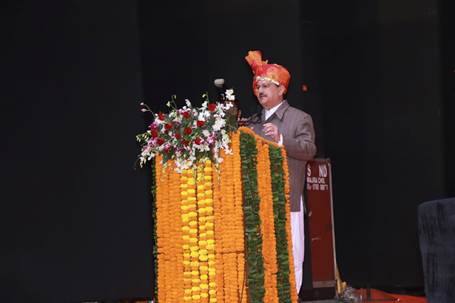
The Union Health Minister informed that many new strategies were taken to make TB services patient-friendly and decentralized. He noted that today TB is detected early, thanks to the network of over 1.7 lakh Ayushman Arogya Mandirs across the country. He also highlighted that the government has significantly scaled up diagnostic services by increasing the number of laboratories from 120 in 2014 to 8,293 laboratories today. “The Union Government introduced daily regimen of drugs sensitive TB including a new shorter and more effective regimen which has improved the TB treatment success rate to 87%”, he further stated.
Shri Nadda highlighted that Ni-kshay support worth Rs 3,338 crore has been provided through direct benefit transfer to over 1.17 crore TB patients. He also stated that the government recently increased the Ni-kshay poshan amount from Rs. 500 to Rs. 1000 and added energy boosters for the nourishment support for TB patients.
Shri Nadda informed that the government has now made it mandatory for even private practitioners to notify any new TB patients so that their treatment can be followed up immediately. “This might look like a small step but it has led to an 8-fold increase in the rate of TB notifications in the private sector”, he stated.
He also highlighted that the rate of TB decline in India has doubled from 8.3% in 2015 to 17.7% today which is much ahead of the global average. He also informed that deaths due to TB has also reduced significantly in India by 21.4% in the last 10 years.
The Union Health Minister ended his address by encouraging all the stakeholders to reiterate their commitment to end TB.
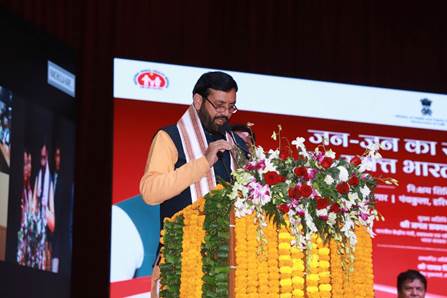
Speaking on the occasion, Shri Nayab Singh Saini expressed his elation at the fact that the intensified 100-day TB campaign has started from Haryana and assured that Haryana would strive to play a prominent role in the fight against TB in India. He said that India has fought against TB through the medium of successful campaigns like Jan Bhagidari, Ni-kshay Poshan Yojana, Fit India and Khelo India which are admired across the world.
Shri Nayab said that the government is working on “4Ts” to eliminate TB which are test, track, treat and technology. He noted that intensified testing in the last 10 years has led to the discovery of new TB cases which are being treated for free. He urged everyone to upload the data of every new TB case in the Ni-kshay portal which also provides timely updates to TB patients. He also stated that the government is working with NGOs and civil society to further bolster its TB elimination efforts.
Smt. Punya Salila Srivastava, Union Health Secretary assured the government’s commitment to ensure that there would be no shortage of either medicines or consumables. She appealed to all sections of civil society to participate actively and make the campaign a success.
During the launch event, Shri Nadda unveiled national guidelines for the implementation of the new drug-resistant TB regimen, BPaLM. These guidelines are designed to standardize and streamline the administration of this advanced treatment, which offers improved outcomes for patients struggling with drug-resistant TB. Additionally, he launched campaign materials, including a comprehensive concept note and Information, Education, and Communication (IEC) resources in various regional languages. The Union Health Minister also honored TB Champions and Ni-kshay Mitras, and distributed food baskets during the event.
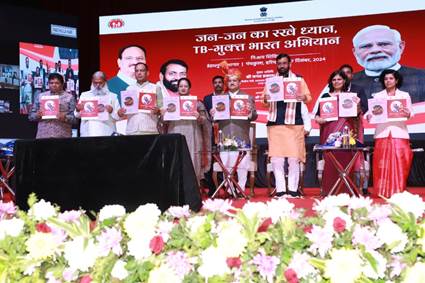
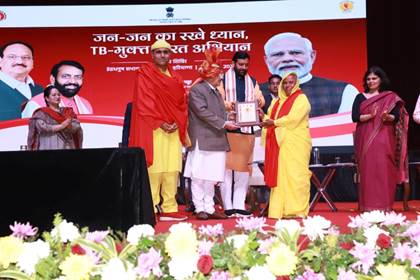
“Ni-kshay Vahaan” were also launched today from Haryana which are mobile vans that will detect and treat patients all over the country.
Background:
The campaign underscores the government of India’s commitment to achieving the goal of end-TB by addressing the challenges of tuberculosis (TB) notification and mortality in India under the National TB Elimination Programme (NTEP) of the Ministry of Health and Family Welfare. The event has garnered the attendance of other government dignitaries, officials from the Union Health Ministry, the Haryana state government, and representatives from the civil society.
Given the differing levels of challenges across geographies, the NTEP has designed a stratified approach to implement this campaign. The 347 districts across 33 States/UTs have been selected based on indicators such as death rate, presumptive TB examination rate, and incidence rate as compared to the national average. This campaign is designed to strengthen programmatic activities to improve TB outcomes across the country.
The objectives of the campaign are to increase case detection through intensified case finding drives using advanced screening and diagnostic technologies to reduce delays in diagnosis and treatment initiation. Parallelly, to reduce mortality due to TB, the programme will expand access to novel initiatives such as the Differentiated TB Care to provide specialised care for high-risk patients and increased nutritional support through Ni-kshay Poshan Yojana.
Some highlights of the campaign will include deployment of mobile ultraportable, AI-enabled X-ray units and molecular tests to bring advanced diagnostics closer to people, especially in remote areas. In addition to screening vulnerable people for TB symptoms, the NTEP will be screening all high-risk groups for TB, irrespective of whether they display symptoms or not. This is considering the recent findings in the Lancet and through the sub-national TB Prevalence surveys. Given the recent announcements of monthly support under NPY increasing from the existing ₹500 per month to ₹1000 per month for all TB patients as well as expansion of the ambit of PMTBMBA to cover all household contacts of TB patients, the campaign will ensure expanded access to nutritional support as both an enabler of TB treatment and tool of prevention. Lastly, the programme will leverage the vast reach of Ayushman Aarogya Mandirs, through which TB services have been decentralized, bringing quality care closer to people’s homes.
Smt. Aradhana Patnaik, Addl. Secretary, Union Health Ministry and senior officers of the Union Health Ministry and Government of Haryana were present at the event.


